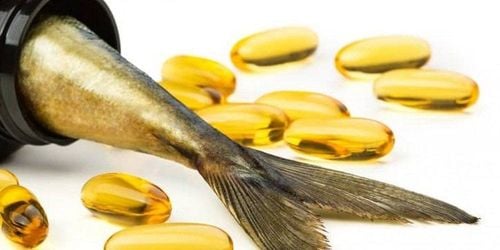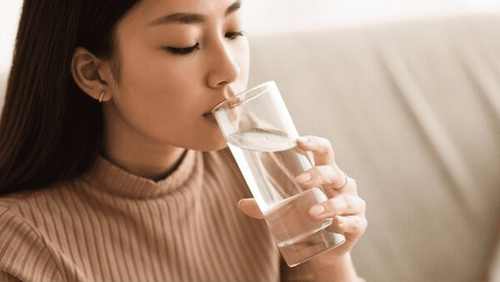During the menstrual cycle, many people experience uncomfortable symptoms such as abdominal cramps, headaches, nausea, fatigue, bloating, diarrhea, and mood changes. Adjusting your diet during your period can help alleviate these symptoms.
1. What Should You Eat During Your Period?
If you're wondering what to eat during your period, here are some recommendations:
1.1 Drink Plenty of Water
Staying hydrated is always good advice from experts, especially during menstruation. Common period symptoms include cramps and body aches, and drinking enough water can help reduce headaches and cramps. It is recommended to drink at least 2 liters of water per day.
1.2 Fruits
Fruits with high water content, such as apples, pears, and watermelons, help curb sugar cravings while providing essential nutrients and vitamins. Eating naturally sweet fruits can supply your body with the necessary sugar without relying on refined sugar.
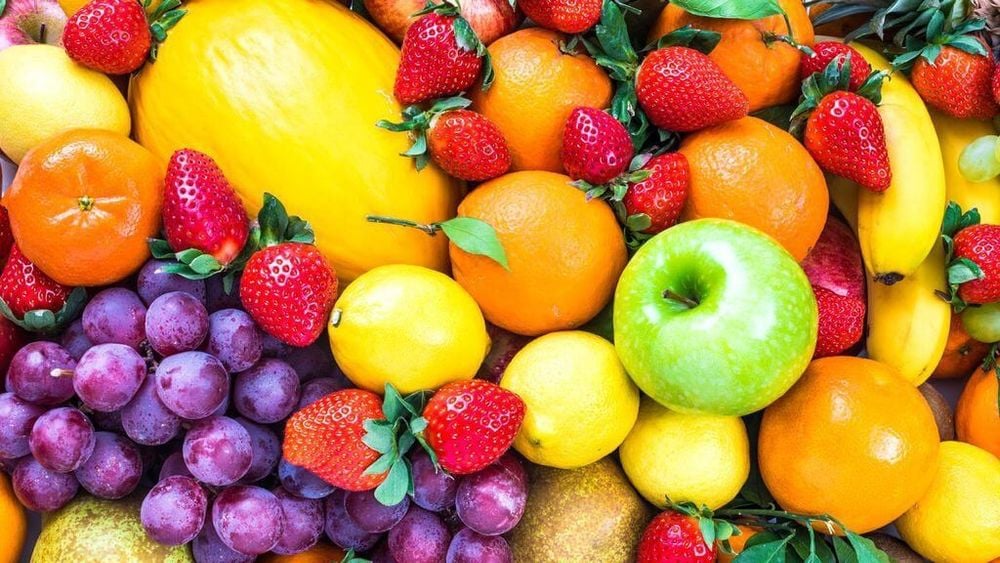
1.3 Leafy Green Vegetables
During menstruation, women often experience a drop in iron levels, especially if they have a heavy flow. This can lead to fatigue, dizziness, and body aches. Consuming leafy green vegetables like kale and spinach can help replenish iron levels. Additionally, spinach is rich in magnesium, which benefits overall health.
1.4 Ginger
A cup of ginger tea can help relieve some menstrual symptoms. Ginger has anti-inflammatory properties that can soothe muscle pain during periods. It also helps reduce nausea and vomiting. However, consuming too much ginger (over 4g per day) may cause heartburn and stomach discomfort.
1.5 Chicken
Chicken is rich in iron and protein, making it an essential food to include in your diet. Eating protein-rich foods can improve overall health, keep you feeling full for longer, and reduce cravings during menstruation.
1.6 Fish
Fish is rich in iron, protein, and Omega-3 fatty acids, making it an excellent nutritional addition to your diet. Consuming fish helps replenish iron levels, preventing iron deficiency during menstruation. Omega-3 also helps reduce the intensity of menstrual pain and can alleviate symptoms of depression and mood swings during your period.
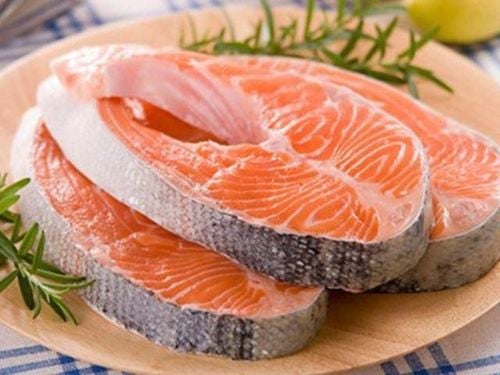
1.7 Turmeric
Turmeric is an anti-inflammatory spice, with curcumin as its main active ingredient. Those who incorporate turmeric into their diet often experience milder menstrual symptoms.
1.8 Dark Chocolate
Dark chocolate is packed with iron and magnesium. A 100g bar of dark chocolate provides 67% of the daily iron requirement and 58% of the daily magnesium requirement. Magnesium helps ease menstrual symptoms and improve mood.
1.9 Flaxseed oil
Every 15ml of flaxseed oil contains 7,195 mg of Omega-3 fatty acids. Consuming flaxseed oil can help relieve constipation, a common issue during menstruation.
1.10 Legumes
Beans and tofu are protein-rich foods, making them excellent meat substitutes for vegetarians. They are also high in iron, which is crucial during menstruation when iron levels drop.
1.11 Yogurt
Many women experience yeast infections during or after their period. For those prone to such infections, probiotic-rich foods like yogurt can help nourish good bacteria in the vagina, reducing the risk of infection. Additionally, yogurt is high in magnesium and essential nutrients like calcium, making it a great addition to your period-friendly diet.
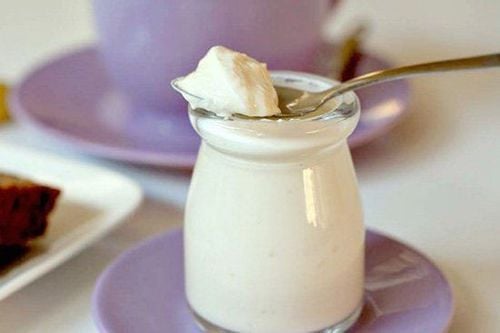
1.12 Peppermint Tea
Peppermint tea can help soothe menstrual symptoms, including cramps, nausea, and diarrhea.
2. Foods to Avoid During Menstruation
While all foods can be consumed in moderation, some may worsen menstrual symptoms. Here are the foods women should limit during their period:
2.1 Salt
Consuming too much salt can lead to water retention and bloating. To reduce bloating during menstruation, it's best to cut back on salt and avoid processed foods high in sodium.
2.2 Sugar
It's okay to consume sugar in moderation during your period. However, excessive sugar intake can negatively impact mood. If you tend to experience mood swings, anxiety, or depression during your cycle, consider monitoring and reducing your sugar intake.
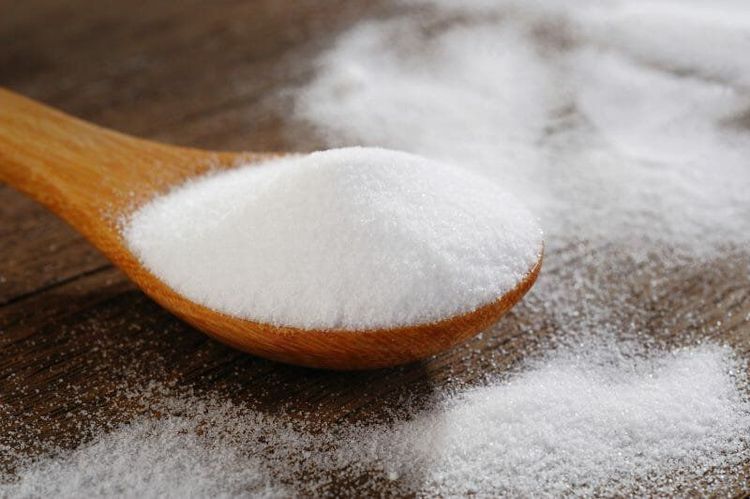
2.3 Coffee
Caffeine can cause water retention and bloating, potentially worsening headaches. However, quitting coffee abruptly may also lead to withdrawal headaches. If you usually drink coffee daily, consider reducing rather than eliminating it. Caffeine can also cause digestive issues, so those prone to diarrhea during their period should limit coffee intake.
2.4 Alcohol
Alcohol can have several negative effects on the body and may worsen menstrual symptoms. It causes dehydration, which can intensify headaches and bloating. Additionally, alcohol may lead to digestive issues such as diarrhea and nausea.
2.5 Spicy foods
Spicy foods can irritate the stomach, leading to nausea, diarrhea, and abdominal discomfort. If you’re not accustomed to spicy foods or have a sensitive stomach, it's best to avoid them during your period.
2.6 Red meat
During menstruation, the body produces prostaglandins, which help the uterus contract and regulate the menstrual cycle. However, high levels of prostaglandins can cause cramping. Since red meat contains high amounts of prostaglandins, limiting its intake may help reduce menstrual cramps.
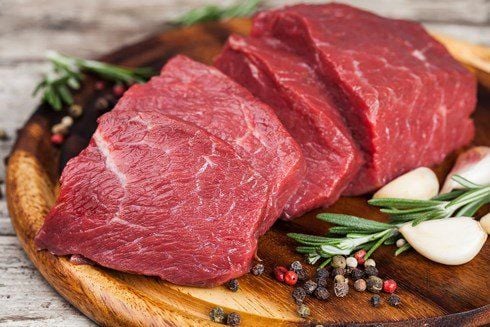
2.7 Foods That Cause Intolerance
If you have a known food intolerance, it's best to avoid those foods, especially during your period. For example, if you are lactose intolerant, consuming dairy during menstruation may lead to bloating, nausea, diarrhea, or constipation.
In the meal plan for menstruation days, women should consume certain foods that help alleviate symptoms and limit those that may worsen discomfort.
To arrange an appointment, please call HOTLINE or make your reservation directly HERE. You may also download the MyVinmec app to schedule appointments faster and manage your reservations more conveniently.
Reference source: healthline.com
To arrange an appointment, please call HOTLINE or make your reservation directly HERE. You may also download the MyVinmec app to schedule appointments faster and manage your reservations more conveniently.

